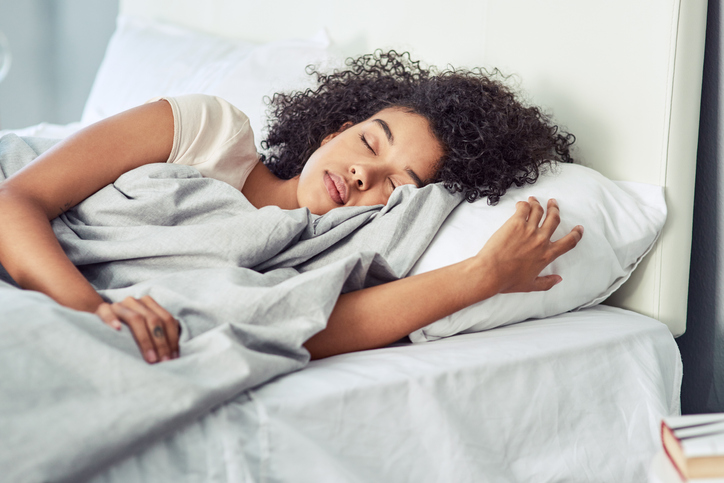Feeling tired today? The amount of sleep you get can affect everything from your mood to your driving, but it’s something that we can all struggle with from time to time. According to a study by Aviva, 67 percent of UK adults suffer from disrupted sleep, and nearly a quarter manage no more than five hours a night. And, while the same report found that improving sleep is the biggest health ambition for 26 percent of us, almost half don’t take any measures to help. If you’re one of these numbers, listen up, as we’ve gathered the best advice to show you how easy it can be to improve your nights, starting from today. You’ll be feeling more refreshed in no time!
Try to optimise your surroundings
“Ensure your bedroom is the perfect place to get a good night’s kip,” advises Cheryl Lythgoe, matron at Benenden Health (benenden.co.uk). “Firstly, try to avoid working in your bedroom if you are working remotely during lockdown. Associating your bedroom with a workplace may stop you from ‘winding down’ in the evening. Make sure your room is at optimum temperature – you should aim for it to be between 18-21 degrees Celsius. Also make sure your bedroom has good blackout blinds, as lighter evenings and mornings may disrupt your sleep cycle.” You can also try wearing a sleep mask if this isn’t possible.
Check your bedding
“A comfortable and supportive bed is vital,” says GP Dr Riccardo Di Cuffa from Your Doctor (your-doctor.co.uk). “Don’t underestimate the power of a good mattress. It should be flipped every three months to prevent indentation, and clean sheets are important, too.”
Establish a routine
“Take some time out to wind down before you go to bed with activities like reading or taking a bath,” Cheryl recommends. “It may be worth writing a “to do” list for the following day so you can organise your thoughts and clear your mind about any stress or anxiety.”
Use magnesium
“Consider taking a magnesium supplement, a powerful relaxation mineral, before going to bed,” advises Suzy Glaskie, functional medicine certified health coach and founder of Peppermint Wellness (peppermintwellness.co.uk). “Or, you could run a hot bath and add magnesium-rich Epsom salts.”
Don’t lie in bed awake
“If you can’t get to sleep, or wake up in the night, get out of bed,” says Kathryn Pinkham, NHS insomnia specialist and founder of The Insomnia Clinic. “The longer we lie in bed trying to fall asleep, the more frustrated we get. This means we relate bed to feeling stressed and being awake , so leave the bedroom and do something relaxing, such as reading, then go back to bed when you’re tired.”
Breathe easy
This breathing exercise, from Stuart Sandeman, founder of Breathpod (breathpod.me), will maximise the rest and digest response and slow the mind. “In this state, we feel calm and able to sleep with ease.”
1. First, inhale through your nose for a count of four.
2. Hold your breath for a count of six
3. Exhale through pursed lips for a count of eight.
4. Repeat for four rounds.
Avoid stimulants
“The effects of stimulants can take hours to wear off and can have a big impact on how quickly you fall asleep and the quality of it when you do,” says Cheryl. “Nicotine causes your heart rate and alertness to increase, meaning that you feel more awake before you go to sleep. It enters the bloodstream within a few minutes but after a few hours it will begin to leave your body and, due to its addictiveness, your brain will wake you up for more nicotine, causing a more disruptive night. Meanwhile, alcohol may make you feel drowsy, but it can disrupt you later in the night and won’t allow you to fall into the deep sleep that you need. Avoid caffeinated drinks like tea and coffee before bed, however some studies suggest that malty drinks or warm milk could aid sleep.”
Try visualisation
“Find a quiet place and sit in a relaxed position with your eyes closed,” says hypnotherapist Ailsa Frank, author of Cut The Crap & Feel Amazing (ailsafrank.com). “Then, visualise yourself walking along a beach, with the waves coming in and out on the shore. Imagine the beach represents your whole life, and each grain of sand symbolises your skills, talents and experiences. Imagine you are holding a handful of sand that represents your stresses. See how small the sand grains are in comparison with the vastness of the whole beach. Allow them to slip through your fingers as you imagine letting go of your problems and the waves washing them away. There will always be things we have to deal with in life, so you will always have a small pile of sand in your hand, but you can let it go each day. Try this technique on the train or bus home or after dinner in the evening to relax.”
Steer clear of naps
“If you are having trouble sleeping at night, you could be tempted to catch up with naps when you finish work on an evening,” says Cheryl. “The more you nap, the less likely your body will be ‘ready’ for sleep when the time arrives to go to bed. If you feel like you are getting tired during the day, stand up and take a walk, get some fresh air or do something that will challenge your brain for a while, such as a crossword or word search.”
Do the rapid eye-blinking technique
“This technique relaxes you and tires your eyelids,” explains Ailsa. “Lay in the dark with your eyes open. Begin slowly counting backwards from 300 in your mind until you feel you can’t keep your eyes open any longer. Then blink rapidly, as fast as you can, for 30 seconds, or until your eyelids begin to feel heavy. When you can’t blink your eyes any more, close them, and feel yourself let go as you drift off to sleep.”
Peaceful picks
These top buys will help improve your sleep and allow you to wake up feeling refreshed
Deep Sleep Pillow Spray

Simply spray this blend of lavender, chamomile and vetivert to help calm both your mind and body before sleep. £19.50, thisworks.com
Badger Sleep Balm

Apply this balm on your lips, chest, temples or hands and inhale the scents of rosemary, bergamot and balsam fir to quiet your mind. £11.99, hollandandbarrett.com
Better You Magnesium Flakes

Add these mineral flakes to a warm bath to help soothe tired and aching muscles for the ultimate in relaxation. £9.95 for 1kg, available from Holland & Barrett, Boots, Superdrug, Lloyds Pharmacy, Amazon and online at betteryou.com
Kalms Night One-A-Night

This traditional herbal medicinal product is used for the temporary relief of sleep disturbances, exclusively based on long standing use. Always read the leaflet. Available at supermarkets and pharmacies nationwide and online at kalmsrange.com
My DNA Health Sleep

These supplements contain natural ingredients that still a busy mind and also stimulates the natural production of melatonin to induce a restful sleep. £29, mydnahealth.co.uk





















